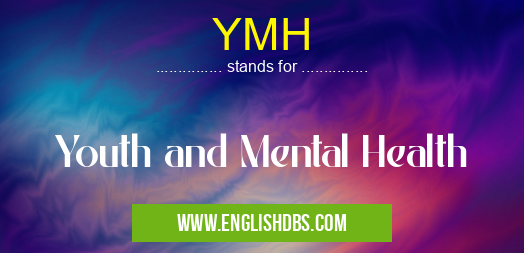What does YMH mean in YOUTH
YMH stands for Youth and Mental Health. This abbreviation is widely used in the context of mental health services and support for young people.

YMH meaning in Youth in Community
YMH mostly used in an acronym Youth in Category Community that means Youth and Mental Health
Shorthand: YMH,
Full Form: Youth and Mental Health
For more information of "Youth and Mental Health", see the section below.
What does YMH Stand for?
YMH specifically refers to:
- Youth: Individuals typically between the ages of 12-24
- Mental Health: Conditions that affect a person's emotional, psychological, and social well-being
YMH Meaning in COMMUNITY
YMH services and initiatives aim to promote mental health and well-being among young people in various community settings. These services include:
- Mental health screenings and assessments
- Counseling and therapy
- Educational programs on mental health
- Peer support groups
- Crisis intervention services
Essential Questions and Answers on Youth and Mental Health in "COMMUNITY»YOUTH"
What is the prevalence of mental health disorders among youth?
Mental health disorders are highly prevalent among youth. According to the World Health Organization, approximately 10-20% of children and adolescents worldwide experience a mental health disorder.
What are the common types of mental health disorders in youth?
Common mental health disorders in youth include anxiety disorders (e.g., generalized anxiety disorder, social anxiety disorder), depressive disorders (e.g., major depressive disorder, persistent depressive disorder), attention-deficit/hyperactivity disorder (ADHD), and conduct disorder.
What are the risk factors for mental health disorders in youth?
Risk factors for mental health disorders in youth include:
- Family history of mental illness
- Trauma or abuse
- Stressful life events
- Peer problems
- Certain personality traits
- Biological factors
What are the signs and symptoms of mental health disorders in youth?
Signs and symptoms of mental health disorders in youth can vary depending on the disorder, but may include:
- Changes in mood (e.g., irritability, sadness)
- Changes in behavior (e.g., withdrawal, aggression)
- Difficulty sleeping or eating
- Physical symptoms (e.g., headaches, stomach aches)
- Difficulty concentrating or paying attention
- Suicidal thoughts or behaviors
How are mental health disorders in youth diagnosed?
Mental health disorders in youth are typically diagnosed by a mental health professional, such as a psychiatrist or psychologist. Diagnosis involves a comprehensive assessment that includes:
- Clinical interview
- Psychological testing
- Review of medical and family history
What are the treatments for mental health disorders in youth?
Treatments for mental health disorders in youth may include:
- Therapy (e.g., cognitive behavioral therapy, family therapy)
- Medication (e.g., antidepressants, antipsychotics)
- Lifestyle changes (e.g., regular sleep, healthy diet, exercise)
- School-based interventions
What can I do if I think my child or teen is struggling with mental health issues?
If you think your child or teen is struggling with mental health issues, it's important to seek professional help. You can start by talking to your child's pediatrician or school counselor. They can help you assess the situation and refer you to a mental health professional.
Final Words: YMH is a crucial acronym that highlights the importance of addressing mental health needs among youth. By providing accessible and comprehensive services, communities can support the well-being of young people and ensure their optimal mental health outcomes.
YMH also stands for: |
|
| All stands for YMH |
